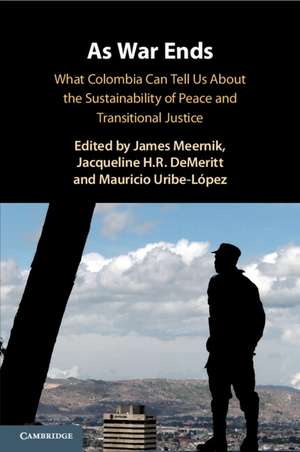As War Ends: What Colombia Can Tell Us About the Sustainability of Peace and Transitional Justice
Editat de James Meernik, Jacqueline H. R. DeMeritt, Mauricio Uribe-Lópezen Limba Engleză Paperback – 29 iun 2022
Preț: 293.80 lei
Nou
Puncte Express: 441
Preț estimativ în valută:
56.23€ • 58.08$ • 46.79£
56.23€ • 58.08$ • 46.79£
Carte tipărită la comandă
Livrare economică 25 martie-08 aprilie
Preluare comenzi: 021 569.72.76
Specificații
ISBN-13: 9781108713085
ISBN-10: 1108713084
Pagini: 445
Ilustrații: 58 b/w illus. 16 tables
Dimensiuni: 152 x 229 x 23 mm
Greutate: 0.59 kg
Editura: Cambridge University Press
Colecția Cambridge University Press
Locul publicării:New York, United States
ISBN-10: 1108713084
Pagini: 445
Ilustrații: 58 b/w illus. 16 tables
Dimensiuni: 152 x 229 x 23 mm
Greutate: 0.59 kg
Editura: Cambridge University Press
Colecția Cambridge University Press
Locul publicării:New York, United States
Cuprins
Introduction James Meernik, Jacqueline Demeritt and Mauricio Uribe-Lopez; 1. The complexity of the organizational design for implementation of a peace accord: a predictable obstacle to the Peace Agreement with the FARC? Santiago Leyva and Pablo Correa; 2. Violence, grassroots pressure, and Civil War peace processes: Insights from the Colombia-FARC conflict J. Michael Greig ; 3. Land, violence, and the Colombian peace process Jacqueline Demeritt, Amalia Pulido, David Mason and James Meernik; 4. Determinants of state strength and capacity: understanding citizen allegiance Juan Albarracín and Sarah Zukerman Daly; 5. The threat of organized crime in post-conflict Colombia Gustavo Duncan and Camila Suárez; 6. Violence after peace Jennifer S. Holmes and Viveca Pavon-Harr; 7. Two emblematic peace building initiatives in Antioquia: a comparative analysis of peace infrastructures Mauricio Uribe-López and Valeria Correa-Barrera; 8. From counterinsurgency to peacebuilding: addressing barriers to lasting peace in Colombia Oliver Kaplan and Joseph Young; 9. Transitional justice in the Colombian final accord: text, context, and implementation Jason Quinn and Madhav Joshi; 10. The comprehensive system of truth, justice, reparation, and non-repetition: precedents and prospects Onur Bakiner; 11. Una tierra inexplorada: gendering the peace process in Colombia Jacqueline Demeritt and Kimi King; 12. Leading the public to peace: trust in elites, the legitimacy of negotiated peace, and support for transitional justice Ryan E. Carlin, Jennifer L. McCoy and Jelena Suboti; 13. Securing the peace and promoting human rights in post-accord Colombia: the role of restorative, reparative, and transformative justice dimensions Rebekka Friedman, Nelson Camilo Sánchez and Eric Wiebelhaus-Brahm; 14. Achieving an unpopular balance: post-conflict justice and amnesties in comparative perspective Geoff Dancy; 15. Countering violent extremism through narrative intervention: for a decentering of the local turn in peacebuilding Carlo Tognato; 16. Geographies of truth in the Colombian transitional justice process Adriana Valderrama, Melina Ocampo, Fernando Hoyos, Mariluz Gonzalez, David Rincon, Edison Vargas and Maria Cristina Paton; Conclusion James Meernik, Jacqueline Demeritt and Mauricio Uribe.
Descriere
A comprehensive and timely analysis of the prospects for peace and justice in Colombia.
